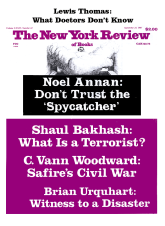In response to:
From World War to Cold War from the June 11, 1987 issue
To the Editors:
Your reviewer of Winston S. Churchill, Road to Victory, 1941–1945 [NYR, June 11], while pleased with my efforts to obtain testimony from those who were in personal contact with Churchill during the war years, goes on to write that the “three dimensional” aspect of Churchill’s relationship with Roosevelt may only be known when other historians are able to study “the private family papers—and particularly those of Clementine Churchill.”
This statement implies either a partiality of selection on my part (which is abhorrent to me and to my methodology), or incompetence.
A brief postcard of enquiry could easily have solicited the information that every letter which Churchill wrote to his wife (as also to his children), including every reference in those letters to Roosevelt, is in my book. I have never suppressed a single personal letter of Churchill to his wife, or to anybody else, however outspoken, intimate, or revealing of his inner thoughts that letter might be. I have indeed gone out of my way to publish such letters.
Martin Gilbert
Oxford, England
Timothy Garton Ash replies:
Martin Gilbert responds to a criticism that I did not make, while not responding to more serious criticisms that I did make. Who ever accused him of “suppressing” Churchill’s personal letters? Certainly not I. When I say that one is “left wondering if future historians may find more material in the private family papers” to illustrate “in three dimensions rather than two” the very special relationship between Churchill and Roosevelt, I am obviously thinking of the whole range of material often to be found in family papers: not just letters from Churchill, but also letters from other family members to him and to other family members, letters they exchanged with friends and associates, memoranda, notes, diaries, and so forth. How much material of this kind exists, and what light it may yet cast, directly or indirectly, on the complex subjects under discussion—this is information that could hardly be elicited by even the longest postcard of enquiry.
This Issue
September 24, 1987



